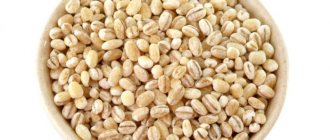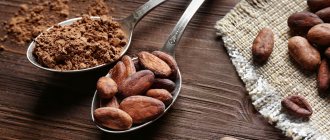Is it possible to eat fruit during breastfeeding or not?
Pediatricians advise nursing women to give preference to fruits that grow in their area of residence. Women's bodies are already adapted to them, and the baby became acquainted with these fruits in the womb. But there is an exception to this rule: for example, hypoallergenic bananas. Avocado, like banana, also causes allergies only in rare cases. Therefore, its inclusion in the diet during breastfeeding is quite acceptable.
It is important to take into account the fact that if a woman has not eaten avocado before and during pregnancy, it is better not to conduct such experiments during breastfeeding.
At the very least, abstain until your baby is 5-6 months old. Allergy to latex and citrus fruits is also a contraindication for the use of avocados in the diet of a nursing mother.
Avocado recipes for nursing mothers
When you decide for yourself what you can eat avocado while breastfeeding, you still need to decide whether you should limit yourself to just raw fruit or whether you can prepare different dishes from it. Naturally, this is a matter of taste. But we can recommend a variety of recipes:
- Avocado will be a great addition to any vegetable, meat or fish salad.
- It can be used to make guacamole - a great thick sauce that can be spread on bread.
- Avocados can be baked on their own or in combination with other non-sweetened foods.
Is it possible to eat in the first month of a baby’s life and from what month is it permissible?
In a newborn baby, the gastrointestinal tract is still immature , which causes intestinal disorders, colic and increased gas formation.
In addition, the baby’s body is not yet resistant to potential allergens, so doctors do not recommend that a nursing woman eat foods that can cause allergies and follow a strict diet at first.
Avocado can be gradually included in your menu during breastfeeding, when the baby is 3 months old. It is during this period that most children experience colic and flatulence, and the functioning of the gastrointestinal tract normalizes. The child’s body’s resistance to allergens also increases significantly. Now the mother’s diet can be expanded.
Composition and calorie content
There are more than 400 species. Asia is considered the birthplace of the exotic fruit, but it is grown in Africa, America, Israel, and Australia.
Avocado is a single-seeded berry that tastes like a vegetable. Size varies from 500 g to 1.5 kg. The peel is dense, dark green. The pulp is yellow, rarely light green with an oily consistency. There is a large seed in the center of the fruit. Contains fatty acids. That is why the fruit has a high calorie content. 100 grams contain 150-200 kcal.
The fruits do not contain sugar, which makes it possible to use it in dietary nutrition. Avocado helps a nursing mother recover after childbirth, and helps the baby receive the maximum amount of nutrients through breast milk.
Nutritional value of the fruit:
• proteins – 2 g; • fats – 14.6 g; • carbohydrates – 1.8 g; • coarse fibers – 6.7 g.
| Vitamins | Macronutrients | Microelements | Fatty acid |
| A, B1, B2, B4, B5, B6, B9, C, K, RR | Potassium, calcium, sodium, magnesium, phosphorus | Iron, manganese, copper, selenium, fluorine, zinc | Polyunsaturated, monounsaturated, saturated |
Beneficial features
Avocado, also called alligator pear, is an incredibly healthy fruit. Nature has endowed it with a huge amount of nutrients necessary for the body. The composition of avocados is so rich that the fruit can easily replace special vitamin complexes for nursing women. Let's take a closer look at what substances avocados contain and how they affect the body:
| Fatty acids: omega 3, palmitic, oleic | They remove harmful cholesterol and toxins from the body, promote better brain function, prevent the growth of cancer cells, normalize the functioning of the nervous system, and improve metabolism. |
| Vitamin A | Responsible for vision, skin and hair condition, and participates in the restoration of epithelial tissue. Valued in cosmetology. |
| Vitamin B12 | Helps improve memory, normalizes blood pressure, improves appetite, participates in blood circulation and the formation of nerve fibers. Improves sleep due to the production of the hormone melatonin. |
| Vitamin K | Participates in the processes of regulation of blood clotting. This is important for wound healing. |
| Vitamin E | Vitamin of beauty and youth. Nourishes and moisturizes hair and skin, prevents premature aging processes. Antioxidant. Strengthens blood vessels and removes toxins. |
| Vitamin C | Promotes the body's resistance to colds and infections, is responsible for immunity. |
| Calcium | A necessary element for strengthening bones and teeth, it is involved in the synthesis of insulin. |
| Magnesium | A necessary element for the proper functioning of the nervous system, it has an anti-inflammatory effect, helps regulate the functioning of internal organs. |
| Iron | Promotes the supply of oxygen to tissues and organs, necessary to maintain hemoglobin at the proper level to avoid the development of anemia. |
| Potassium | It has a beneficial effect on the functioning of the cardiovascular system, strengthens the heart, and increases resistance to stress. |
| Phosphorus | It has a beneficial effect on the health of bones and teeth, participates in metabolism, and supplies the body with energy. |
| Folic acid | Participates in regeneration processes. |
| Protein protein | Building material for muscles. Useful for a beautiful figure. Often used as a dietary supplement for weight loss. |
The fruit contains fatty acids in large quantities, its calorie content is off the charts. However, avocado does not contain harmful fats and sugar, which allows even people with diabetes to eat this fruit. One of its beneficial properties is protecting vision from ultraviolet radiation.
Is it possible to have other exotic fruits during breastfeeding, such as kiwi? You will find the answer to this question in the next article.
Benefits for the mother
If a breastfeeding woman regularly eats this tropical fruit, she will notice significant changes in her health:
- Improved sleep and mood. Many women suffer from postpartum depression, and avocado will help cope with this.
- The emergence of new forces . Due to its calorie content, avocado is a source of energy. Therefore, if the mother eats the fetus, her performance will increase and her overall well-being will improve.
- Normalization of stool, stimulation of intestinal function. After childbirth, many women suffer from constipation. Avocado will gently help get rid of this problem.
- Increased skin tone, improved condition of hair and nails. Often, due to a lack of vitamins, nursing mothers begin to lose hair, nails become brittle, and the skin suffers. The vitamins contained in avocados will quickly cope with this problem.
- Normalization of hormonal levels. After childbirth, women experience changes in their bodies associated with hormonal changes. Instead of hormonal medications, mom can normalize hormone levels by eating avocados.
- Improving vision, strengthening bones and teeth. This is also true for a woman who has recently given birth.
- Strengthening the immune system. Usually, after experiencing stress during childbirth, a woman’s immunity is greatly reduced. She needs to increase the body's resistance to infections.
- Acceleration of metabolic processes in the body. This will help the mother lose the extra pounds gained during pregnancy. Nutritionists recommend the fruit for those losing weight.
Benefits for the child
A baby who receives the beneficial substances contained in avocados while breastfeeding will grow and develop well. Vitamins, minerals and microelements in the fruit will have a positive effect on the growing body and will contribute to:
- development of a child's vision;
- growth and strengthening of bones and teeth;
- maintaining proper hemoglobin levels and reducing the risk of anemia;
- normalization of stool, especially if the baby suffers from diarrhea;
- stimulation of mental activity, which contributes to the harmonious development of the baby;
- the body's resistance to viral infections, strengthening the immune system.
What are the benefits of avocado?
First of all, the advantage of avocado is its high nutritional value. Just 100 g of this fruit contains:
- two grams of protein (or almost 2.5% of the norm in one day);
- almost 15 grams of fat (which is 22.6% of the norm);
- about 2 grams of carbohydrates (1.4% DV);
- almost 7 grams of dietary fiber (33.5% of daily intake).
The energy value is 160 kcal, and fiber is considered beneficial for the intestines, as they help cleanse its walls of toxic substances and toxins. They also serve as food for healthy microflora.
In addition, avocado contains minerals such as potassium and calcium, zinc, magnesium and copper, phosphorus, iron and manganese.
In terms of vitamin content (groups B and A, C, as well as K, PP, E), avocados are superior to healthy seasonal fruits.
Despite the calorie content of the fruit, its soft part is used for dietary nutrition. Therefore, after childbirth, the fetus is recommended to be eaten by those mothers who want to lose extra pounds. Avocado saturates the body quite quickly and keeps you feeling full for a long time.
The fruit promotes the absorption of fat-soluble vitamins, since its content of healthy fats is quite high. Thanks to this, the body receives important elements for normalizing brain activity and lung function. The product also has a beneficial effect on the metabolism in cells, helping to accelerate it, which results in rejuvenation of the skin. Avocados help cleanse blood vessels of bad cholesterol and reduce the possibility of developing pathological heart diseases. With constant consumption of the tropical fruit, the functioning of the gastrointestinal tract is stabilized.
Vitamins A and C contribute to strengthening the immune system, which have a positive effect on vision, help in the absorption of essential amino acids and the breakdown of protein in muscle tissue. Vitamin B restores the nervous system, normalizes hormonal levels, helps fight signs of depression after childbirth, and gives the body strength and energy. The antioxidants present in avocados prevent the development of cancer and vascular diseases. Such an important component as glutathione relieves the liver of excessive stress and stops the action of almost forty carcinogens.
What is dangerous in avocado for mother and child?
A possible side effect from eating this fruit may be allergies. Moreover, one of the dangerous symptoms is not considered to be a rash on the baby’s body, but the manifestation of bronchospasms, signs of suffocation or Quincke’s edema. If the baby has hypersensitivity or intolerance to the product, then even death is possible, so a new ingredient must be introduced into the diet of a nursing woman quite carefully.
Despite all the benefits of avocados, a child may have allergies or gastrointestinal disorders.
Cross-allergy is also possible. If a mother or child has a reaction to kiwi, bananas and latex, then there is a high probability of an allergy to avocado. If the fetus is consumed by a breastfeeding woman, the baby may experience digestive upset in the form of diarrhea, constipation, colic or bloating. The baby sleeps poorly, cries and behaves restlessly.
Possible harm from use
In exceptional cases, the fruit can harm the mother or child.
This could be an allergic reaction or individual intolerance to the product. To avoid negative consequences, consider the following recommendations:
- If the mother or child has liver problems, it is better to avoid this fruit, as it may worsen the situation.
- Under no circumstances should you eat the peel and pit of the fruit; they contain toxic substances.
- If, after introducing avocado into the diet, the mother notices the slightest signs of an intestinal disorder or allergy, she should exclude the fruit from her menu for several months.
People with allergies to citrus fruits and latex products should not eat alligator pear.
Rules for eating avocado during breastfeeding
It is necessary to correctly introduce the fruit during lactation and subsequently follow the basic recommendations for its use. Natural feeding limits not only the quantity of avocados, but also the method of use for cooking. It is important to choose the right exotic fruit when purchasing. Once cleaned, it must be used immediately, since the pulp quickly darkens and the active nutrients are oxidized.
On a note! The product increases the nutritional value of breast milk, but the described vitamin and mineral composition is contained only in fully ripened fruits.
In what form can a nursing mother eat avocado?
When breastfeeding, you are allowed to eat fresh, high-quality fruits. Peels or seeds should not be added to dishes; they contain toxic components that can cause poisoning in mother and baby. If necessary, add the fruit to a hot dish, this should be done at the end of cooking. Regular consumption of pulp by a woman will have a beneficial effect on the health of the baby.
How to properly introduce avocado into the diet of a nursing mother?
Recommendations for expanding the menu during breastfeeding:
- consult a pediatrician about which month to introduce avocados;
- try a new product in the morning;
- the first time it is permissible to eat 1 tsp. pulp;
- carefully monitor the child’s reaction for at least 2 days;
- gradually increase the volume of the daily portion;
- do not add other new products for about a week;
- keep a food diary.
On a note! Allergies can be cumulative and may not appear immediately. In this case, it is necessary to follow a hypoallergenic diet until the symptoms disappear, then gradually expand the menu using the previously introduced ingredients.
How many avocados can you eat during lactation?
The recommended daily dose of tropical fruit is 70-250 g. When breastfeeding, it is undesirable to eat more than 1 medium fruit per day. If a nursing mother or baby is overweight, use no more than ½ pc. per day. It is allowed to add dishes with this fruit to the menu 2-3 times a week. Neglecting basic recommendations can cause indigestion.
How to choose?
In order not to harm yourself and your baby, it is important to choose a sufficiently ripe fruit. There is an opinion that the color of a ripe avocado must be dark green or brown. This is not entirely true, because there are many varieties of this fruit. Their external characteristics differ, so color is not the main indicator of fruit ripeness.
When purchasing, you need to pay attention to the following signs:
- Cutting. If it falls off easily when pressed, the fruit is most likely ripe. Also pay attention to the mark from the cutting. If it is too dark, the fruit is already overripe and should not be taken.
- The fruit should not be soft and release juice when pressed. There should also be no dents when pressed. The shape of a normal fetus will quickly be restored after pressing. If the avocado is soft and dents remain, it means that it has already begun to deteriorate inside and should not be eaten.
- The presence of dark spots in a small amount indicates the ripeness of the fruit. But if there are more than 30%, the fruit cannot be purchased, it is infected with a specific avocado disease.
You can simply shake the avocado, you should hear the sound from the grain inside the seed. In an unripe fruit, the grain fits tightly to the seed. If you choose between unripe and overripe fruit, it is definitely better to buy an unripe avocado. At room temperature, the fruit will reach its condition in a few days, like a pear, for example.
If you don’t have time to wait, you can put it in a bag with bananas and apples, and it will ripen in just a day. This is explained by the fact that the apples and bananas in the bag will begin to release ethylene, which will help the avocado to ripen quickly.
Recipes with exotic fruit
There are several recipes for preparing dishes using this fruit.
Avocado sandwiches
The easiest way to make hearty sandwiches is with avocado. To do this, you will have to cut one fruit and mash its pulp with a fork or spoon. Then a thin piece of bread is cut, the surface of which is carefully covered with crushed pulp. To make the sandwich more satisfying, the bread is additionally greased with butter.
Avocado fruit salad for nursing mothers
It's no secret that when breastfeeding, the list of fruits you can eat is limited. However, despite this, nursing mothers can make fruit salad. It is prepared from the following ingredients:
- apple;
- avocado;
- banana;
- yogurt.
The listed ingredients are cut into small pieces and mixed with yogurt. The prepared salad is eaten within 10-30 minutes after cooking.
Avocado smoothie
When creating a smoothie, grated avocado is mixed with chopped banana. Then the fruit mixture is covered with granulated sugar and poured with 500-600 milliliters of water. The mixture is added to the blender and blended for one and a half minutes.
Rules for introducing into the diet
When introducing this exotic fruit into your diet, you should adhere to some recommendations:
- You need to start with very small volumes, gradually increasing the amount of portion you eat.
- The first time you can eat a small piece of avocado, about a teaspoon.
- After the first dose, you need to wait a few days (3-5) and watch the baby’s reaction.
- If no negative reactions occur, next time you can double the portion.
- The maximum you can eat is half an avocado per day, two fruits per week.
- If an allergic reaction occurs, the fruit must be excluded for a time agreed with a pediatrician.
- You cannot introduce two new foods into your diet at the same time.
- Be sure to eat avocados raw and separately from other foods. It is best in the morning, half an hour before meals.
All these recommendations apply not only to avocados, but to any other new products. If you follow all the requirements and rules, the risk of harming the baby is minimal.
Reviews from nursing mothers about eating avocados
Here are the reviews shared by women who ate avocados while breastfeeding:
- I don’t like this fruit, but in order to diversify my diet, I periodically consumed it when my baby was 5 months old. I didn't notice any negative aspects.
- I started introducing this exotic at 3 months, as my pediatrician recommended. I started with the smallest pieces - the child did not develop any allergies. Then she gradually increased the amount. And everything was fine.
- I recommend the fruit to improve your baby's nutrition. In many countries, avocados are eaten regularly to provide the body with everything it needs. My baby did not react negatively to this kind of complementary feeding from his mother.
- My son reacted with an allergy at 4 months when I tried avocado, so I no longer took the risk.
Considering the combination of benefits and possible harm from this fruit, it is worth noting that it should be included in your diet. But do this only if the woman herself does not have an allergic reaction to it. In all other cases, adhere to the recommendations presented in this article.
Recipes for mothers while breastfeeding
Here are some ways to prepare delicious and healthy dishes that are allowed during lactation.
Smoothie
You will need:
- Banana - half.
- Avocado – half.
- Apple – 1 pc.
- Low-fat yogurt - 1 cup.
- Sugar – 1 tsp.
Place all the fruits and yogurt in a blender and blend until smooth.
Salad
Ingredients:
- Boiled eggs – 2 pcs.
- Cucumber – 2-3 pcs.
- The pulp of half an avocado.
- Lemon juice.
- Yogurt.
- Salt.
Preparation:
- Cut the cucumbers into strips or cubes.
- Grind the eggs.
- Add avocado pulp to cucumbers and eggs.
- Add salt to taste.
- Sprinkle with lemon juice.
- Top with yogurt.
Chicken salad
Ingredients:
- Boiled chicken breast – 300 g.
- Avocado pulp.
- Bell pepper – 1 pc.
- Hard cheese – 100–150 g.
- Tomatoes – 2 pcs.
- Cucumbers – 2–3 pcs.
Cooking method:
- Chop and mix everything.
- Grate the cheese on a coarse grater and add to the rest of the ingredients.
- Add salt to taste.
- Season the salad with olive or sunflower oil.
You can also make a quick sandwich so you don't have to waste time cooking. You need to mash the avocado and spread the pulp on bread. Place slices of boiled meat on top and sprinkle with herbs.
Before preparing any multi-component dish, keep in mind that all ingredients must already be present in your diet and not cause allergies in your baby. If you have not eaten any ingredient during lactation, try introducing this product into the menu first and only then include it in the dish.
Avocado is a real storehouse of beneficial components for the body. By eating this fruit during lactation, a nursing mother will be able to improve both her health and the health of her baby. Instead of pharmacy vitamin complexes, avocado will solve many problems that a woman has after childbirth. It is important to take into account all the recommendations on the rules for introducing avocados into your diet, as well as choose ripe and high-quality fruits.
How to use it correctly?
In addition to the fact that the beneficial substances that avocados are rich in have a beneficial effect on the mother’s body, they also pass into breast milk, thereby promoting the proper development of the baby.
During lactation, avocados (and all other fruits and vegetables) should be introduced as carefully as possible; it is best to do this in small portions. After feeding new foods, it is necessary to carefully monitor the child’s reaction and immediately remove them from the diet if negative reactions occur. According to experts, it is best to introduce avocado into the mother’s diet when the child is at least 2 months old.
Tip: how to choose a ripe avocado.
When eating avocado on a regular basis, one should not forget about its high calorie content, especially for those mothers who want to get rid of excess weight acquired while bearing a child as quickly as possible. To prevent avocados from causing you to gain extra pounds, it is recommended to consume no more than 1 fruit per day. As a rule, avocados are placed in various salads, but eating it in this form is acceptable after the child has already adapted to other salad components. Dishes that include avocado must be prepared from proven, high-quality products that are safe for the baby’s body.
The benefits of avocado during breastfeeding for mothers.
When consuming a tropical fruit in acceptable quantities, the following is observed:
- improving blood composition, reducing bad cholesterol;
- strengthening the walls of blood vessels;
- assistance in restoring hormonal levels;
- improvement of brain activity;
- increasing stress resistance;
- reduction of swelling;
- increased immunity thanks to vitamin E;
- breast cancer prevention;
- memory improvement;
- help with constipation;
- strengthening bones, nail plates and hair.











